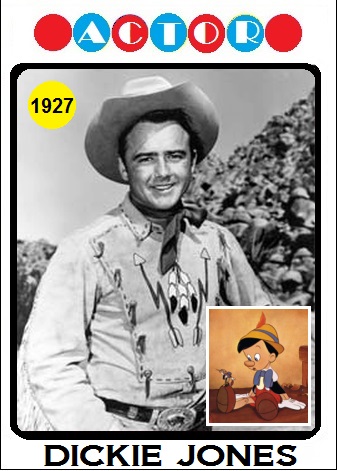
Richard Percy Jones was born Feb. 25, 1927, in McKinney, Texas. His father was a newspaperman and his mother was a bit of a stage mother. By the time he was about five, Jones was performing at rodeos, billed as the world's youngest trick rider and roper.
His big show-business break came when movie cowboy Hoot Gibson saw him perform at a rodeo in Dallas. "Hoot told my mother the famous words, 'That kid ought to be in pictures,'" Jones said in a 1984 Los Angeles Times interview. "She said, 'Whoopee!' and away we went to Hollywood." He worked almost steadily, often in westerns.
He was in a variety of big pictures, including the Laurel and Hardy classic Babes in Toyland (1934) as well as Stella Dallas (1937), Young Mr. Lincoln (1939), Mr. Smith Goes to Washington (1939), and Destry Rides Again (1939). He was also in some "Our Gang" shorts.
Jones appeared in more than 100 films and television shows in his long career, but he is best known, by far, for a film in which he was never seen onscreen, and for which his name never appeared in the credits. At about 10, when he was known as "Dickie," Jones was chosen by Walt Disney to be the voice of Pinocchio in the classic 1940 animated film. Disney wanted a real youngster for the part of the wooden character who wanted to be a real boy, and Jones' voice entered animation history.
The voicing of Pinocchio, which took place over about a year and a half, was most enjoyable, in part because Jones got along so well with adult actor Cliff Edwards, who voiced Jiminy Cricket. At times Jones's lip movements were filmed in close-up to help guide animators working on the character. For the musical number "Hi-Diddle-Dee-Dee," he was dressed in costume and filmed as he danced, also as a reference for animators.
The most difficult sequence was when Pinocchio had to speak while under the sea. "They had a real problem trying to make me sound like I was underwater," he said in the Times interview. He was even subjected, briefly, to an infamous interrogation technique. "They had me lie on a table and poured water in my mouth while I tried to read the dialogue—I almost drowned." The problem was finally solved by the use of a rotating gadget while he spoke.
Jones was drafted into the Army in 1944, and after his discharge he appeared in several more films. In the 1950s, his career got a boost in early television, with roles on shows such as The Lone Ranger, and he played the title role in the 1955 Buffalo Bill Jr. series. But late in the decade, when landing roles became tough, he started to get involved in real estate and founded a real estate agency. His last acting role was in the 1965 western Requiem for a Gunfighter. In 2000, Dickie Jones was named a Disney Legend.
Jones, 87, died on July 7, 2014, of natural causes, after a fall at his home in Northridge, California.
--Eternity Tours
All content
(c) 2005-2014 alt.obituaries Deadpool. All rights reserved.